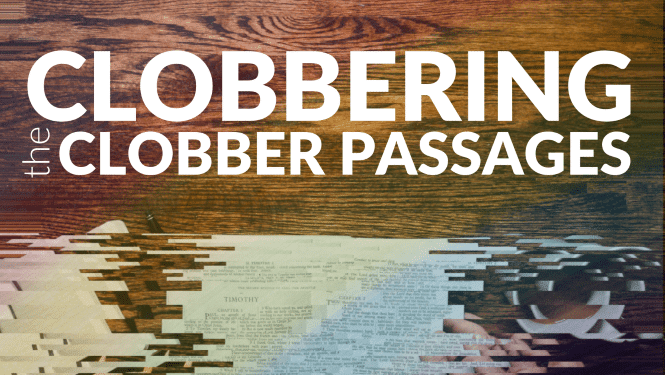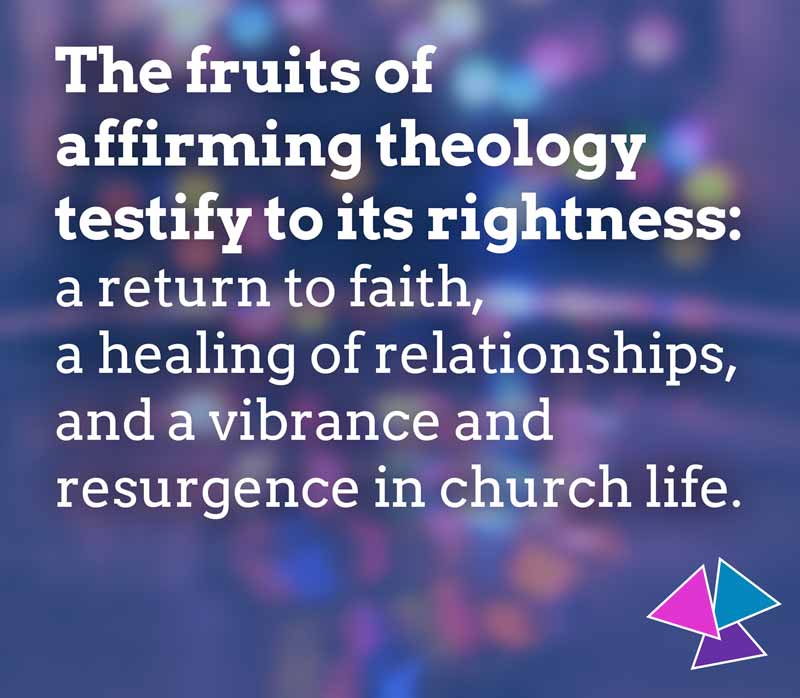Share This Post
The first question I asked myself when I realized I like guys is one that we still get regularly at Queer Theology:
Is it OK to be gay, bisexual, or transgender and Christian? Like, really?
Have you asked yourself that question? What steps did you take to find the answer? If you’re like me, you may have done something like this:
- Google “Is it OK to be gay/transgender and Christian?”
- Click on every single link on the first 12 pages of results
- Read every article
- Feel convinced that it’s OK to be gay once you read an affirming article
- Feel convinced that, actually, it’s not OK to be gay once you read an anti-gay rebuttal
- Repeat.
I rode that hamster wheel for ten years before finally FINALLY coming to trust that yes, you can be gay, bisexual, transgender, or queer and a Christian, that being LGBTQ is a normal, natural part of the diversity of God’s creation.
But how do I know?
What “they” say the objection is: 7 “clobber” passages
If you talk to a Christian who believes that being queer is a sin, they’ll usually reference one or more of several anti-LGBTQ clobber passages:
- Genesis 1 & 2: Adam & Eve, not Adam & Steve
- Genesis 19: Sodom and Gomorrah
- Leviticus 18:22 (and Leviticus 20:13): Abominations
- Romans 1: Unnatural Relations
- 1 Corinthians 6:9 and 1 Timothy 1:10: effeminate and homosexual offenders
(Supposedly anti-transgender Bible passages are rarely part of these discussions)

Put the clobber passages to rest for good by learning how they’re misinterpreted and breathe some queer life into them instead.
Are you are sick of defending yourself or loved ones against the same ole scripture passages time and time again?
Have you had enough of being continuously clobbered by the Clobber Passages?
This is workshop designed for you and how to finally clobber those Clobber Passages. So, let’s dive deeper into how these clobber passages are misinterpreted and how they’re actually queer.
There’s a name for what’s happening here: proof texting.
Theopodia defines proof texting as “the method by which a person appeals to a biblical text to prove or justify a theological position without regard for the context of the passage they are citing.”
If you hear someone say “the Bible says…” run in the other direction. The Bible says lots of things!
Here a few things the Bible says:
That the Earth was covered in water when created until God formed land (Genesis 1:9) but also that the Earth was completely dry until God brought streams up and watered the planet (Genesis 2:5-6).
That God created animals first and then humans (Genesis 1) but also that God created Adam first, then animals, then Eve (Genesis 2).
That’s right, the Bible contradicts itself in the first two chapters!
“The Bible says” in Exodus and Deuteronomy that if a woman is raped her rapist must either marry her or pay her father (because he’s “damaged” the father’s “property”).
Paul says in 1 Thessalonians that Jesus will return in his own lifetime (4:15-17).
So what does the Bible say?
The Bible says a whole lot of things—and that makes perfect sense!
The writings we call “the Bible” were written by dozens of authors over the span of millennia. In fact, some books seem to be a combination of multiple pre-existing sources. For example, the first five books of the Hebrew Bible appear to draw from four difference sources, called JEDP while Matthew and Luke draw upon Mark and another shared (though unknown) source referred to as the Q source.
When I first heard this, my faith was rocked! I had always imagined Moses scrawling Genesis, Exodus, Leviticus, Numbers, and Deuteronomy himself. I’d been told that Matthew’s writing were his direct observations and divinely-inspired recounting.
If the first five books of the Hebrew Bible are really just a mashup of older, ancient religious legends and Matthew and Luke probably should have included a bibliography… what did that mean for my faith?
Here’s what it means: the authors of the Bible were struggling to make sense of themselves, the world around them, and their relationship to something bigger than themselves just as much as you or I.
That doesn’t make the Bible less true, that makes it more true.
Justice or Judgement?
So if you can proof text your way into any position, what use is the Bible in making decisions to guide your moral, God-centered life?
When I look at the Bible, I see an unmistakable pursuit of justice.
God using Joseph to save his family from famine in Genesis. God leading the Hebrew people out of slavery in Egypt in Exodus. God appointing Deborah as prophetess and leader of Israel in Judges. The prophet Amos calling out for justice to roll down like a mighty river.
And then there’s Jesus. Jesus, there’s Jesus!
The Messiah born to an unwed, immigrant teenager mother who heard voices living under occupation in the Middle East. That is who Christians claim to be our Messiah.
Jesus who counted women as his friends and followers (and who was challenged by a woman and changed his views in response!). Jesus who dined with prostitutes and sent adulterers away without judgement.
What the objection really is: power
For every verse that anti-LGBTQ Christians say condemns homosexuality, there are a dozen that clearly condemn something we support or support something we condemn (which isn’t to say that those passages even do condemn queer people).
You could go back and forth proof texting with your parent or your pastor or yourself all day long and it won’t get you anywhere.
Here’s why it works: anti-LGBTQ Christianity isn’t really about the Bible or God’s will at all.
It works because there has been a pervasive idea that LGBTQ are sick and perverted. It relies on the “ew” factor and then asks you to take a few vague passages from the Bible out of context to condemn every queer person in a way that would never work for say, wearing clothes with mixed fabrics, what to do in response to rape, or even getting a divorce.
Jesus tells us in Matthew 7 that “by their fruits you will recognize” whether a religious teaching is true or not.
The fruits of anti-LGBTQ theology reveal its falseness: depression, despair, suicide, fractured families, loss of faith, bullying, harassment.
The fruits of affirming theology testify to its rightness: a return to faith, a healing of relationships, and a vibrance and resurgence in church life.

How can you be sure?
I have a confession to make to you: sometimes, when I lay in bed on particularly restless nights (usually when I’ve stayed up way too late and had way too many Pepsis) I stare at the ceiling and contemplate either (a) the vastness and meaningless of the Universe or (b) “what if they are right and it is a sin to be gay???”
And then eventually I fall asleep and allow to slip away three decades of relentless homophobia that have been thrown at me. And I continue to do this work.
Why?
Because I am convinced—utterly convinced—that being LGBTQ is a good and necessary part of the diversity of God’s creation. (tweet it!)
Why?
Because I’ve spent nearly a decade doing faith-based LGBTQ activism and that’s brought me in contact with a whole lot of well-meaning but ultimately anti-queer Christians as well countless LGBTQ folks all around the world.
When I talk to anti-LGBTQ Christians I find uninspiring, internally inconsistent arguments that ultimately boil down to “because I just think being straight is better.”
I’ve worked with over a hundred queer Christians as they walk out of the closet, struggle their way through making sense of their theology, and find acceptance. On the other side of loving and accepting themselves—whether or not they are still Christian—they are happier and healthier.
The fruits are clear and neither angels nor demons, nor well-meaning Christians armed with a handful or cherry-picked out-out-context Bible verses can separate us from the love of God.I had to spend years doing intense advocacy to learn everything I now know about gender, sexuality, and Christian justice. Fr. Shay spent his entire life preparing for ministry (and then three years at seminary). The good news is that you don’t have to travel the country or go to seminary to meet LGBTQ Christians and straight supporters who will inspire and support you in your walk.

